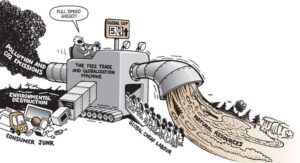Liberal International Relations scholars see globalization as a positive step towards a more interdependent world government. They believe that it promotes economic interdependence, international cooperation, and the spread of democratic values. Regarding economic interdependence, we look at the trades, investments, and finance.
When a country is getting imports necessary for their citizens’ well-being, like food, they want to avoid being in a situation where those imports stop abruptly. To prevent that, from a liberal perspective, they will avert disruptions of security competition. Whether this country is a high power or not, they are having their needs satisfied, and in turn, peace between nations is preferred. There is also a comparative advantage when trade is in an open market system. When one country is not trading with others, they have to be able to satisfy the needs of their citizens in-house, and by that, I mean they need to produce everything with no help. When countries can trade, they do not need to make as much, and they can specialize in something specific. For example, Ireland and China trade dairy and electronics. Ireland has sufficient dairy production because of their geography. They have suitable land for dairy cows, and China has the industry and labor to create electronics. These two countries can get what they need at a low price because it is more beneficial for them to export, and everyone is satisfied. A liberal scholar will see this as a positive, interdependent thing.
Critical theorists see globalization very differently. They see trade and other patterns in globalization as something called dependency theory. The dependency theory explains that the comparative advantage is not because different regions have better or worse conditions to produce specific products but that colonialism created Western ideals. The idea of democracy spread because the great powers said so. That is not a very formal way to put it, but to me, that makes sense. There is constant competition for the top, and through a critical perspective lens, no one will be satisfied with just the status quo. Capitalism and monopolies are seen as favorable to the people who are getting the rewards, more money, less problems. But as companies expand, so will others across seas. This will create a division of labor between leading sectors, which will have very negative impacts on satellite countries.
 Personally, I see both sides. Yes, interdependence, in theory, seems excellent. Peace among everyone, even if it is coerced peace. Globalization created progress because states could collaborate, get the needed materials, and produce newer and better things. Why would that not be good? Because these countries are now connected and almost depend on each other to keep receiving the goods and services they want, they are incentivized to avoid turning on one another. However, we do have to consider that some of these countries may not have wanted to be globalized in the first place. But because the world had so many great powers participating and trading, there was no other way to survive decently without joining the party.
Personally, I see both sides. Yes, interdependence, in theory, seems excellent. Peace among everyone, even if it is coerced peace. Globalization created progress because states could collaborate, get the needed materials, and produce newer and better things. Why would that not be good? Because these countries are now connected and almost depend on each other to keep receiving the goods and services they want, they are incentivized to avoid turning on one another. However, we do have to consider that some of these countries may not have wanted to be globalized in the first place. But because the world had so many great powers participating and trading, there was no other way to survive decently without joining the party.








I agree with what you said about countries not wanting to stop the imports of the everyday needs of the citizen of the country, since no one wants to stop supporting the people which live in their country. So they try to keep the relationships with other countries good so that they can benefit from them and help the people living in their country.